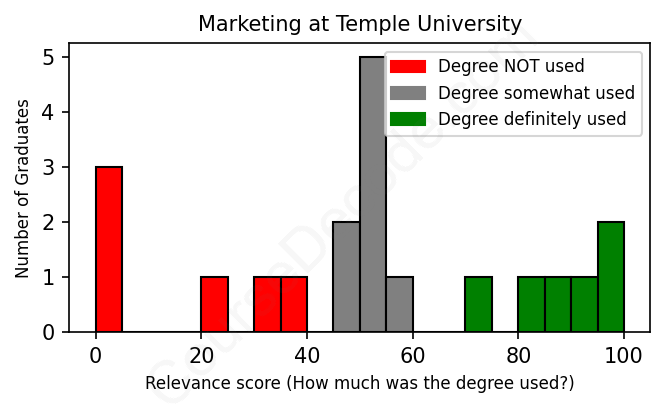
First, some facts. Of the Marketing graduates from Temple University we've analyzed , here's how many have used (or NOT used) their degree in their career:

These are estimates based on AI analysis of 20 LinkedIn profiles (see below).
The verdict? Significantly below average. Overall, with an average relevance score of 51%, Marketing graduates from Temple University have a much lower likelihood (-16%) of finding work in this field compared to the average graduate across all fields:
And for comparison, here's the chart for all profiles we've looked at across all degrees.
Also, after graduating, only 5% of these graduates have pursued further education other than another Bachelor's degree (such as a Masters degree or other), compared to the average across all profiles of 35%. This suggests a Bachelors degree is enough for most Marketing graduates, and it's normal to look for work straight after graduation.
See the details:
|
Relevance score: 50% We think this person has gone into a career only somewhat relevant to their degree. We think this person has gone into a career only somewhat relevant to their degree.
DEGREE INFOGraduated in 2012 from Temple University with a Bachelor of Business Administration (B.B.A.) in Marketing. No other secondary education since. JOB HISTORY SINCE GRADUATIONCustomer Service Nick DeMaio State Farm Apr 2013 - Aug 2013 Buyer  Techni-Tool Aug 2013 - Feb 2018 Procurement Specialist  Merck Feb 2018 - Apr 2019 Data Specialist  WESCO Distribution May 2019 - Sep 2023 Strategic Sourcing Agent  Sinclair Inc. Mar 2024 - Present ABOUTNo information provided. |
The top 10 most common jobs done by the graduates we've analyzed (ranked most common to least) are:
Interestingly, some graduates have found themselves in positions that might leverage certain marketing skills or concepts without being strictly marketing-focused. For example, roles like Happiness Manager or Client Service Associate incorporate elements of customer engagement that are relevant to marketing but are more service-oriented than strategic. On the flip side, some graduates have landed roles where marketing knowledge is crucial, such as Digital Growth Manager or Marketing Associate. Overall, while there are definitely some relevant positions, it seems that a significant portion of these graduates are navigating through their careers in roles that don't directly apply the marketing principles and strategies they studied.
Here is a visual representation of the most common words in job titles for Marketing graduates (this is across all Marketing graduates we've analyzed, not just those who went to Temple University):

From what I’ve seen, graduates from Temple University's Marketing program tend to have pretty diverse career paths after they leave school. For the most part, many of them start out in roles that are somewhat related to marketing, like sales and marketing internships, marketing coordinators, or digital specialists. A common first step seems to be entry-level positions where they’re still figuring out the ropes—jobs at agencies, in customer service, or even being a marketing or sales associate somewhere. Over the years, many of these folks end up thriving in more specialized marketing roles, like SEO analysts or digital strategists, or even managing entire marketing departments. It shows that the foundation they build early on can really set them up for success in the long run.
Fast forward five or ten years after graduation, and you'll see these graduates often climbing the ladder pretty effectively. Some end up in managerial roles, like marketing managers or brand strategists, and others are leading specific initiatives, like social media marketing or digital campaigns. There are even some examples of graduates moving into related areas like procurement and financial roles, but overall, a significant number maintain a strong connection to marketing. While there are a few who might have ventured a bit off course, the general trend is that many of these Temple graduates are doing really well in careers that align with their marketing education, which is definitely encouraging for anyone considering this path!
A Bachelor’s degree in Marketing can be a mixed bag when it comes to difficulty, but at Temple University, it’s generally considered to be on the manageable side. You’ll definitely encounter some challenging concepts, especially around things like consumer behavior and market research, but a lot of the coursework is pretty engaging and hands-on, which helps keep it interesting. Plus, if you have a good grasp of basic math and enjoy creative projects, you might find it easier than some other business degrees. Overall, it’s not a walk in the park, but with some effort and dedication, most students find they can navigate it without too much stress.
Most commonly, in the LinkedIn profiles we've looked at, it takes people 4 years to finish a Bachelor degree in Marketing.
Looking at these Temple University marketing grads, it seems like they’ve had some ups and downs in terms of income. The earlier grads from 2011 and 2012 have bounced around a bit before finding steadier roles, which makes it hard to judge if they banked a decent salary. Some, like the one working as a Regional 401(k) Sales Director, probably pulled in a solid paycheck, while others seem to be at jobs that might not pay top dollar. The newer grads, especially those shifting quickly into roles like the Associate Director of Performance Marketing, look like they’re on a better financial path with salaries likely climbing fast compared to the earlier folks. Overall, it’s a mixed bag – some seem to be doing alright, while others might still be figuring it out.
Here is a visual representation of the most common words seen in the "about" section of LinkedIn profiles who have a Bachelor degree in Marketing (this is across all Marketing graduates we've analyzed, not just those who went to Temple University). This may or may not be useful:

Here are all colleges offering a Bachelor degree in Marketing (ordered by the average relevance score of their Marketing graduates, best to worst) where we have analyzed at least 10 of their graduates: